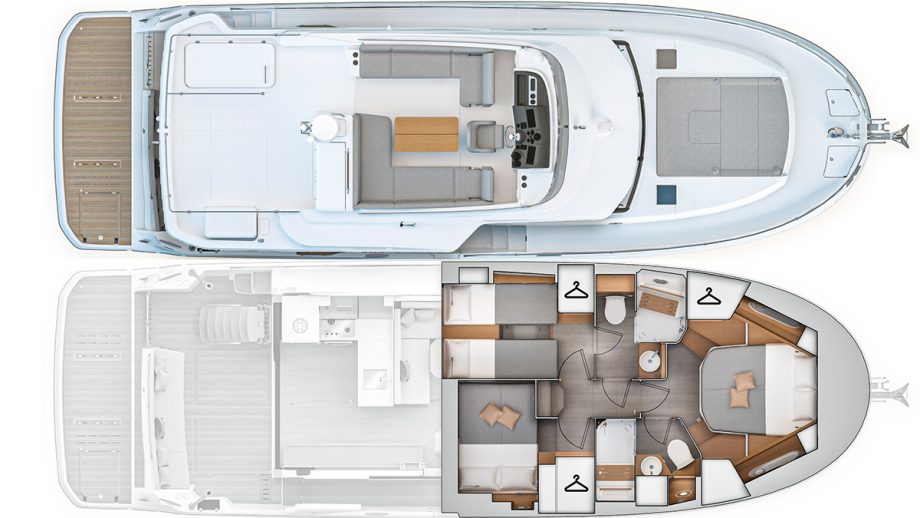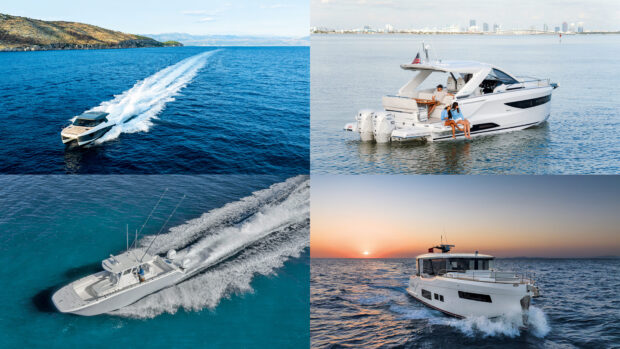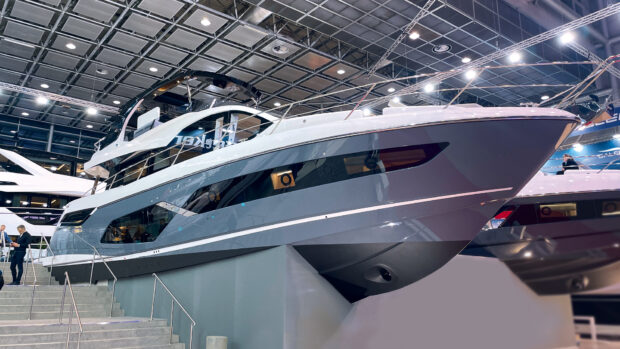An evolution of the outgoing 47, this affordable new semi-displacement/semi-planing flybridge cruiser elevates an already successful go-most-places formula, but is something missing from the Beneteau Swift Trawler 48?
Next year will mark 20 years of Swift Trawlers. The first model, the Beneteau Swift Trawler 42, made its debut at the 2003 Cannes Yachting Festival with a boast that it reinterpreted the trawler yacht concept. And it did.
Not just because it had a sea-kindly semi-displacement hull capable of 26 knots but because it also featured a fresh, modern interior at a surprisingly reasonable price.
In essence it did for trawler yachts what early SUVs like the Volvo XC90, BMW X5 and Land Rover Freelander did for off-roaders by turning a specialist niche product into a mainstream, family friendly cruiser with a whiff of adventure about it.
Its popularity surprised everyone, not least the French builder. Other models were soon added above and below to flesh out the range, which over the years has spanned everything from 30-52ft and sold around 1,500 units to date.
There are presently three core Swift Trawler models – the Swift Trawler 35, the Swift Trawler 41 and the new-this-year Beneteau Swift Trawler 48. The latter has just replaced the outgoing 47 but it is based on the same very capable Micad hull platform with a facelifted exterior from Andreani Design.
Outwardly the differences are subtle. The most obvious is the fashion plates-cum-buttresses, which have been upgraded from bare gelcoat to stainless steel and wood-batten affairs, which reflect the connection with the flagship Beneteau Grand Trawler 62.
Article continues below…

Beneteau Swift Trawler 47 boat test – 24 hours on board

Nordhavn 51 first look: Turn-key trawler yacht promises globetrotting adventures
Asymmetric design
A key ingredient in the Swift Trawler mix has always been its asymmetric deck layout. In this case the whole of the 48’s superstructure is offset to port in order to leave room for a proper mini-ship style side deck to starboard.
This starts on the same level as the cockpit and is protected by reassuringly deep bulwarks, the aforementioned fashion plates, waist high guardrails and a full width upper deck overhang.
All the service points are also located to starboard, so there is never any argument as to which side is preferable when coming alongside for fuel, water or pumping out. In contrast, the side deck to port is narrow, higher than the cockpit and lacks any flybridge overhang.
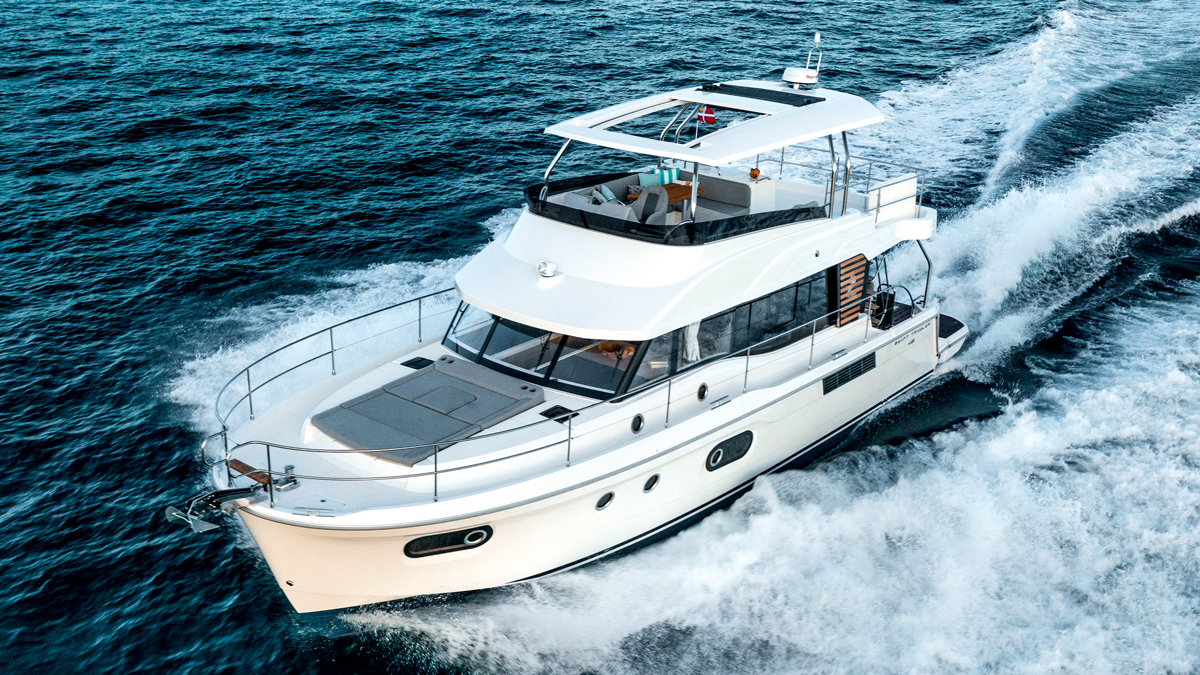
It’s there if you need it as a means of hanging fenders, cleaning windows or getting to the foredeck when things are too busy on the starboard side but you wouldn’t use it out of choice.
Ringed by a high guardrail, the foredeck isn’t just a crewing area, it’s also a generous entertainment space. Part of what looks like one very large sun-pad pulls up to create a backrest that transforms it into a low-slung sofa.
The aft deck is open plan, save for the built-in transom sofa and the stainless steel staircase to the flybridge, so owners can furnish it as they see fit.

The asymmetric decks are biased to starboard and are part of what make the Beneteau Swift Trawler 48 so easy to live with
Interestingly those stairs are rooted to sliding tracks inset into the cockpit sole, which allows the whole structure to stow up against the aft-deck doors by simply pressing a foot pedal and pushing or pulling the handrail. It’s satisfyingly simple to operate and feels very sturdy too.
Sealed off when necessary by a large hatch, the flybridge offers two distinct zones forward and aft of that chunky central mast. The aft area is enclosed by a high guardrail and purposely left clear for whatever use you choose.
Apparently, Swift Trawler owners like to treat this 54ft2 (5m2) space as their backyards, where they can roll out sun-loungers, stow paddleboards or whatever other watersports accessories they may be into.

The flybridge wetbar with optional BBQ grill. Photo: Nicholas Claris
Anyone working the wet bar has a view forward across the comfy seats, which includes an eight-seat dinette to starboard and the L-sofa to port. Incidentally, backrests on both those forward seating areas flip back and forth as required.
The upper helm is on the centreline and has a comfortable bucket seat. There’s also a hardtop with canvas sunroof option, which we would always recommend unless you are subject to air-draught restrictions or the budget simply won’t stretch that far.
Practical interior
Although the hull and deck spaces are similar to the old Beneteau Swift Trawler 47 and all the glazing is much the same, the interior is actually very different. In many ways the 47’s interior was rather out of step with other Swift Trawlers, in that it had a lounge area aft and galley amidships. The Beneteau Swift Trawler 48 has the more usual aft galley.

The aft galley layout makes it easy to serve those sitting in the cockpit. Photo: Nicholas Claris
To port there’s a domestic grade full-height fridge-freezer just inside the aft-deck doors, the two main panes of which slide to port to open wide, and an L-shaped Corian counter complete with gas hobs and oven or electric equivalents and a deep basin with small dishwasher and waste-bin beneath.
A long sideboard runs forward along the starboard side. Everything in that galley area is designed for practicality. The ‘windjammer’ door by the lower helm position is a triumph. When coming alongside you can literally step out onto that starboard side deck but keep your hand on the joystick to guide her in.
Plus you have access to two of the big 16in (40cm) cleats on the toe rail and bulwark that are within arm’s reach to deal with the springs.

Tall guardrails and substantial toerails make for safe movement around the decks. Photo: Nicholas Claris
There’s an adjacent boarding gate set into the bulwark too. The quay we left from and returned to during our sea-trials was just the right height and delivered an almost perfectly flush step ashore – so satisfying when that happens! That sliding helm door incidentally can be locked off by a trigger catch in several positions from slightly ajar to fully open.
Just like the upper helm above, the lower helm has great ergonomics. The bridge console has either twin 9in or 12in Raymarine screens and everything else is where it should be relative to the wheel and the Cummins throttles and joystick.
The high-end pedestal bucket seat with bolster cushion is exactly the same adjustable and swivelling design used for the bigger and more upmarket Grand Trawler 62. It’s a much smarter solution than the 47’s, which is essentially a bench seat for two that’s perched on top of cabinetry.

The oversized wheel makes it easy to swing the rudders from lock to lock. Photo: Nicholas Claris
Sleeping up to eight
The specification sheet claims that there is sleeping accommodation for six plus two. The latter two are overspill berths in the main saloon. With the table down, infill cushions deployed and privacy curtains drawn, the dinette can sleep up to two very comfortably.
The table can be either a single piece one with manual height adjustment or leaved and electric. The lower-deck accommodation consists of three cabins and two bathrooms. The owner’s cabin is forward and has an island bed and generous ensuite with half-height wardrobe.
Then there are two more cabins amidships, a twin bed affair to port with an ensuite and Jack-and-Jill doors so it can also be used as the day heads. Plus there’s a snug transverse double to starboard. The same cabin aboard the old 47 had a forward-facing double.

The forward master cabin with island double. Photo: Nicholas Claris
There’s room enough in the latter for a washer-dryer. Most owners planning to spend more than a weekend aboard will tick that options box. All three cabins have windows of varying sizes to let in natural light as well as opening portholes for fresh air.
And all the beds have stowage beneath the mattresses. Swift Trawler owners, we’re told, are obsessed with stowage. One small niggle on that lower lobby is the way several doors open inboard, meaning you do tend to get ‘trapped’ between the doors.
It wasn’t conceived this way originally but with the washer-dryer installed in the starboard double, the door really needs to open into the corridor rather than into the cabin.

Photo: Nicholas Claris
Performance and economy
There are two Cummins QSB6.7 options, either twin 380hp or 425hp diesels on straight shaft drives. Our test boat, the first Beneteau Swift Trawler 48 off the line, had the least powerful set-up even though the rest of this year’s allocation will all have the 425s, a situation we’re told has more to do with supply-chain issues than buyers’ appetites for more power.
On test the twin 380s delivered a top speed of 21-23.3 knots depending on load state, whereas the 425s should be good for speeds of 24-26 knots. Twin tanks with a combined capacity of 1,930 litres also deliver a useful range, even allowing for a 20% reserve.
With those twin 380s bumbling along at 1,500rpm our own test figures show that the Beneteau Swift Trawler 48 should be able to maintain nine knots for about 650nm. Up the tempo to 2,500rpm and 18 knots and it should still be good for around 380nm.

The hard top is fitted with a sunroof and solar panels
According to Beneteau’s own test data, there isn’t much of a penalty for specifying the more powerful 425s either, with those range figures dropping only slightly to 640nm and 325nm at nine and 18 knots respectively.
We did, however, find our test boat a little noisy at the helm towards the upper reaches of the rev range. The engines sit immediately beneath the main saloon, so perhaps that shouldn’t be too much of a surprise.
Under normal circumstances we would have given you a full set of DB(A) readings at the helm, but we suspect a new sound meter app we were using was over reading by a few decibels, so we have decided not to publish our figures and rely on what our ears were telling us instead.

“Typical owners are experienced boaters who cruise further than the average flybridge owner”
Seakeeping
Handling is surprisingly nimble, certainly more so than the rather bluff exterior styling might suggest. Decent sized rudders bite properly so it will turn nice and tightly with just the right amount of heel.
During our test off Port Ginesta, just outside Barcelona and the location of Beneteau’s Sea-Trial Centre, we had winds of F3 and a fairly lumpy sea, which the Beneteau Swift Trawler 48 took in its stride.
The driving position, whether standing and leaning back on the bolster cushion or sitting properly, is great. The views are close to 360°, aside from some obvious blind spots aft due to the galley modules and full-height fridge-freezer as well as some more cabinetry to starboard.

Stabilisers are not offered as a factory fit option on this model or indeed on any other Swift Trawler model, which we do find a bit surprising.
Given the relatively high centre of gravity and hull shape of the Beneteau Swift Trawler 48, it will roll a bit in a beam sea at trolling speeds, and while stabilisers are an expensive extra that might look out of kilter with Beneteau’s focus on value for money, they do make life aboard more comfortable, especially on a boat which is otherwise well set up for relaxed displacement cruising.
When we raised the subject with Beneteau, their response was that if more potential Swift Trawler buyers asked for them, they would indeed offer them but presently they say they only get one or two enquiries a year for them.

They put this down to Swift Trawler owners being a more hardy demographic, untroubled by the motions of the sea, typically experienced boaters who spend more time aboard and cruise further than the average flybridge or sportscruiser owner.
That said, we know of several Swift Trawler owners who have retrofitted Seakeepers to their craft, even on the smaller ST34, and doubtless one could be added to the Beneteau Swift Trawler 48 too if you wanted to, the lazarette under the cockpit being the obvious place for it.
Beneteau Swift Trawler 48: Our verdict
Like the other Swift Trawlers that have come before it, this new Beneteau Swift Trawler 48 offers a great deal of boat for the money and its combination of timeless styling, voluminous accommodation and practical, family friendly cruising attributes should help keep resale values strong for many years to come.
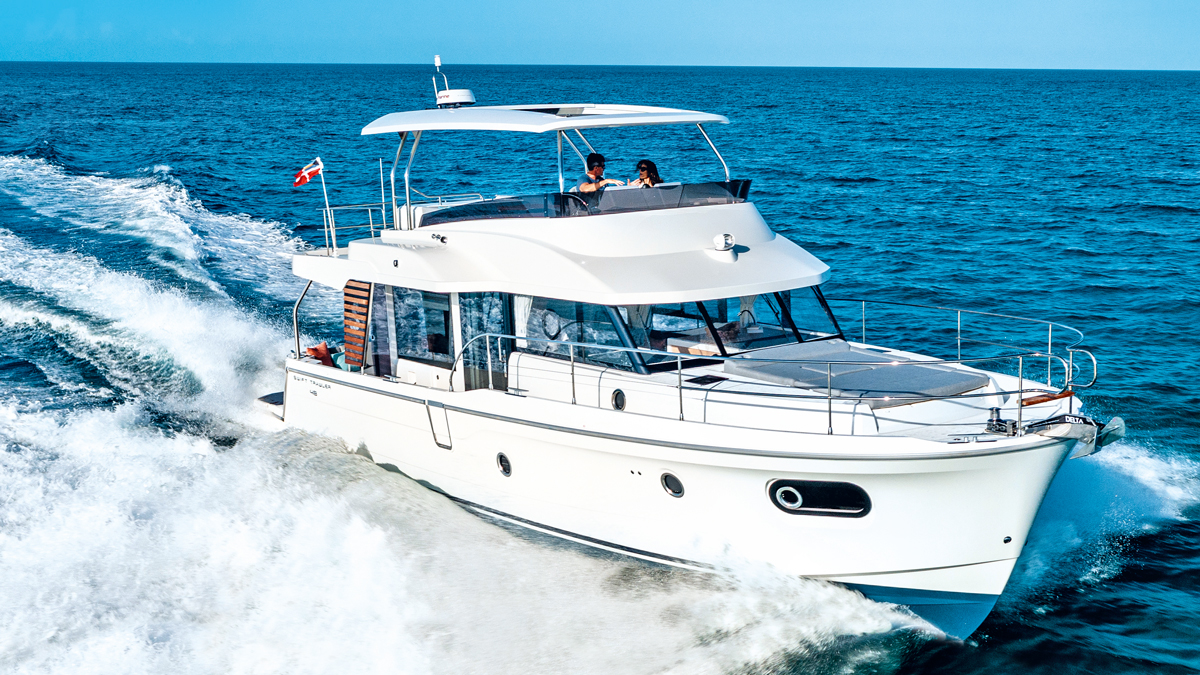
While a number of other manufacturers have now jumped on the fast trawler bandwagon with ever more stylish and luxurious offerings (Absolute, Azimut and Sirena spring to mind), few can match the Beneteau’s trump cards of value for money, simple but reliable shaft drive engineering and a focus on what serious cruising types really want from their boats.
For those who appreciate this more pragmatic approach to boat building, the original swift trawler manufacturer is doubtless still the best.
Beneteau Swift Trawler 48 specification
LOA: 48ft 4in (14.7m)
Beam: 14ft 9in (4.5m)
Draught: 3ft 10in (1.15m)
Displacement: 12.7 tonnes (light)
Fuel capacity: 1,930 litres
Water capacity: 640 litres
Test engines: Twin 380hp Cummins QSB 6.7-litre diesel
Top speed on test: 23.7 knots
Cruising range: 343nm @ 20 knots / 1,520nm @ 6.5 knots
Fuel consumption: 85lph @ 20 knots / 6.6lph @ 6.5 knots
RCD category: B for 12 people
Design: Andreani Design & Micad
Starting price: €696,000 (ex. VAT)
Price as tested: €894,036 (inc. VAT)






The double and twin guest cabins located amidships


The day heads is shared by the guest cabins
